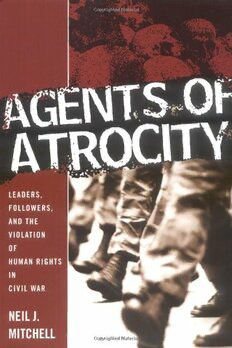
Agents of Atrocity: Leaders, Followers, and the Violation of Human Rights in Civil War PDF
239 Pages·2004·2.759 MB·English
Most books are stored in the elastic cloud where traffic is expensive. For this reason, we have a limit on daily download.
Preview Agents of Atrocity: Leaders, Followers, and the Violation of Human Rights in Civil War
Description:
he gruesome atrocities of civil and ethnic wars are all too familiar, if hardly unprecedented. Mitchell places respon-si-bility clearly in the hands of political leadership, identifying two types of leaders: Machiavellians who strategically use vio-lence to gain and retain power; and Grand Inquisitors who are dogmatically devoted to an ideology and use violence as a form of purification. He explores the interaction of leaders, their management of repression, and the relationship between reason and the passions to shed light on the causes of and respon-si-bility for violations of human rights. By examining the English and Russian civil wars, as well as the Israeli-Palestinian conflict, Mitchell highlights how violence is a choice and individuals are morally accountable. He concludes that holding leaders and their agents responsible for their actions is one of the most important tools for deterring mistreatment of civilians.
See more
The list of books you might like
Most books are stored in the elastic cloud where traffic is expensive. For this reason, we have a limit on daily download.
